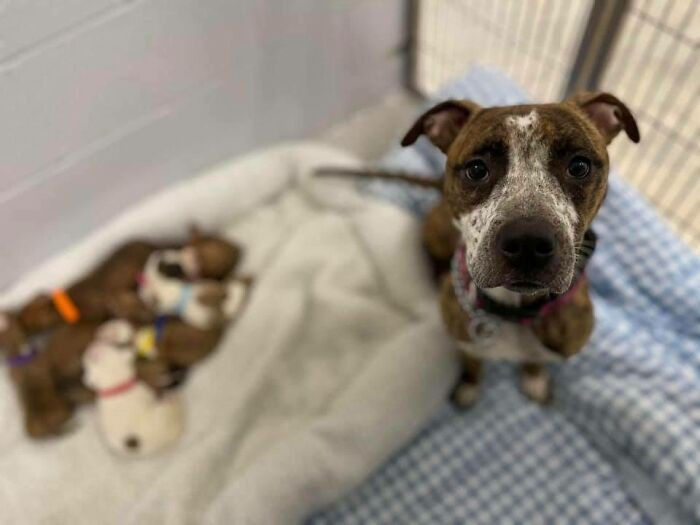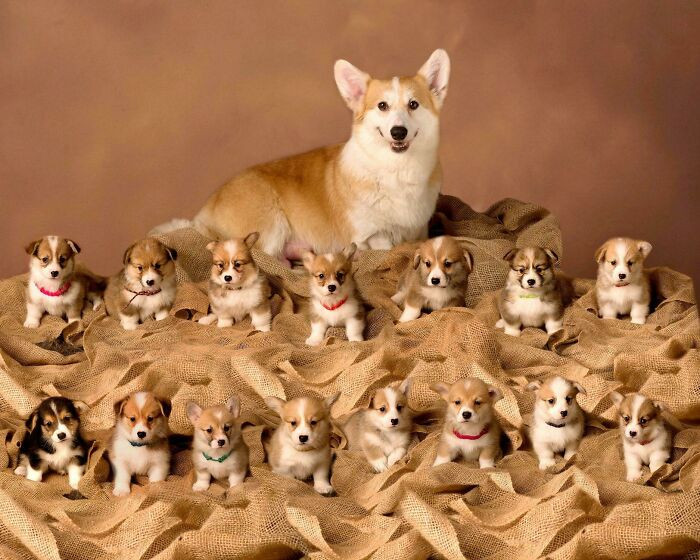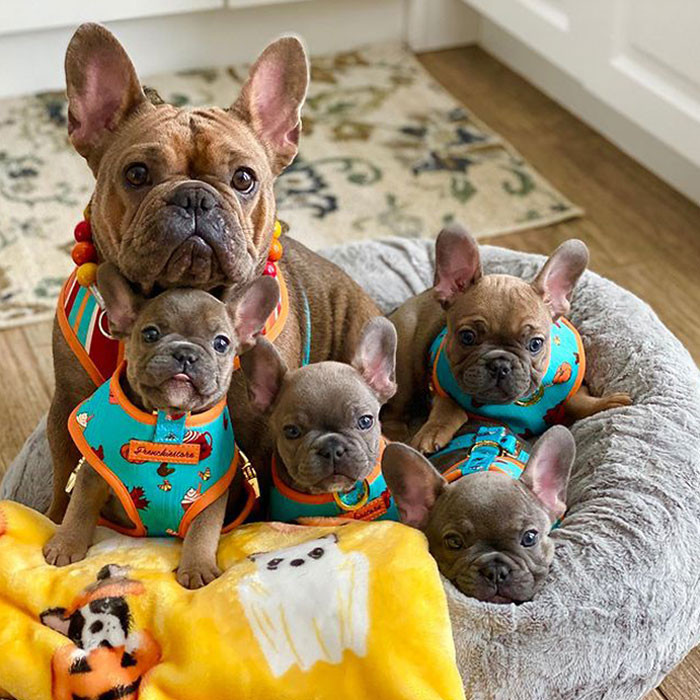Adorable Dog Mommies With Their Pups Will Melt Your Heart
Dogs are, as a rule, wonderful parents. They will never mistreat or abandon their young ones. Newborn pups need special care – they can't see, hear, or walk, and their moms need to help them with everything.
After a while, when the pups grow a bit, it's mom's job to teach them how to be proper dogs. Of course, they do that through play and with a lot of love.
People honor that love by sharing wonderful pictures of proud dog moms and their puppies. We have selected 50 of the most adorable photos (it was a tough job, though), and you will love them....
1. Wow. Who is going to clean up after them?

2. "This Is The Exact Amount Of Puppies I Need In My Life"

3. Happy Mom

4. "Luz's Sympathy To Give Birth To Two Princesses"

In the shelter setting, if moms and puppies are physically housed at the shelter, we have to balance the benefits of keeping them together with the risks of infectious disease that are higher in that setting; ideally, mothers and litters are housed in foster homes, not on-site, as this reduces disease risk and provides a much better environment for important socialization for the puppies through exposure to new experiences and people," Dr. Katribe says.
"If moms and puppies must be housed on-site at the shelter, starting the weaning process and separating puppies from mom earlier will allow them to be adopted sooner; then they can experience socialization in their adoptive home. Even when puppies are housed in foster homes, sometimes it makes sense to wean and separate toward the earlier end of the ideal range – if we move them through faster to adoption, then that foster home is now available to save the lives of other mothers and puppies, dogs that might not have a chance without that foster home."
5. Today My House Went From Zero Dogs To Eleven Dogs In The Span Of A Few Hours. Meet Emmy Lou And Her Pile Of 10 One-Week-Old Puppies"

6. "This Proud Pibble Mama And Her Sweet Pups Made My Day"

7. "Like Mother, Like Son And Daughter, And Son, And Daughter, And......"

8. You Are Safe With Mama

9. "Mama And Her Sweet Little Babies. Can You Believe She Was Going To Be Euthanized?"

10. "When Ravioli Saw His Pups For The First Time"

11. "Even As A Surprise Pregnancy, She Is A Proud Mom"

12. So Happy

13. Just Perfect

14. "Loulou With Her Little Boy"

15. "This Mama Dog Comforting Her Puppy On Its First Day As A Police Dog"

16. Wonderful Family

17. Hello There

18. Pups And Their Mom

19. Proud Mom!

Katribe emphasized that pups should remain with their family until at least seven weeks of age to reach the full mental and emotional development they can achieve only through interaction with their moms, brothers, and sisters.
"The ones that are separated from their mother and litter earlier are more prone to behavior disorders, including separation anxiety and increased fear responses," the doctor explained. "Puppies that remain with their mother and litter longer, particularly if they're being exposed to new experiences, tend to respond better to novel experiences later in life and become better-adjusted pets."
Sadly, pups that are bred specifically for sale at pet stores, for example, are separated from their moms while very young. That implies limited exposure to new sights, sounds, and experiences.
20. Dinnertime

21. "Proud Mama. 9 Golden Retriever/Rough Collie Puppies Born This Saturday"

22. Mom Smiling

23. Dalmatians

24. "Rowena With Her Babies Roz, Harvey, Pru & Brina"

25. Good Work

26. Mama Pug

27. Not Quite What We Were Expecting - Our Foster Dog And Golden Mix Gave Birth Yesterday To Baby Cows. She Is One Proud Mama

28. Love Is In The Air

Erin Katribe, a Medical Director at Best Friends Animal Society, says that pups receive all the nutrients they need from their moms' milk before they switch to solid food (weaning).
"Weaning naturally begins around 4-6 weeks of age when puppies begin to show interest in food," Dr. Katribe says. "At this early stage, however, they should still have access to their mom to be able to nurse, as their transition to solid food is gradual."
This process is very important for puppies; they learn about these activities from their mother and littermates, and the natural progression must be maintained. Otherwise, some problems may arise when the pups get older.
29. "This Is Jessie. A Proud New Mama Of Ten"

30. "Managed To Take This Cute Picture Of My Husky And Her Pup Snuggling Up Together (She's A First-Time Mom And Had 8 Cute Puppies)"

31. How Many?

32. "Our Dog Just Had 9 Puppies And She Is Ecstatic"

33. "So Today I Was Taking A Photo Of A Litter Of One-Week-Old Puppies When I Got Photobombed By My Other Dog"

"The social interaction of the mother with puppies is critical until at least 7 weeks of age, and ideally longer. They learn how to interact with one another – how to 'speak' dog," Dr. Katribe explained.
"For example, through biting and mouthing during play, mom and littermates will signal to a puppy when things get too rough and will end the play – this is how a puppy learns bite inhibition, that mouthing or biting too hard is not OK. This is an important skill for later in life. Puppies also learn about different body postures and types of vocalization, key components of canine communication."
While overwhelmed by this cuteness, it's easy to forget that caring for pups or moms and litters requires a lot of work. "Fostering a mom and puppies or fostering an older puppy (until it is old enough for spay/neuter and adoption) for your local shelter can be a great way to get a small taste of what that's like, without making a longer commitment," Katribe emphasized.
"Fostering also saves lives for shelters that are otherwise stretched for housing space or resources." And, on some occasions, we can't control when a pup is separated. The orphan puppies are the best example.
But there are things that can make socialization easier - "In those situations, it's important to seek advice from an experienced trainer or veterinary behaviorist to have the best chance at achieving social development," Katribe said.
34. "During This Time Of Panic, Here Is Chilli Pepper And Her Baby Peppers Born Last Night"

35. "Foster Mama Ellie, Wondering If There’s A Return Policy On Her Lab Samples"

36. "Keeping An Eye On The Newborns"

37. Proud Mom

38. Confused

39. "6 Hours + 9 Puppies = 1 Tired Mama. Our Sweet First-Time Mama, Ellie Mae And Her Babies"

40. "May I Present To You, The Beautiful And Rare Dogtopus"

41. Full House

42. "My Foster Mama Ellie Had Her Babies Yesterday - Apparently, She Came With A Whole Lab Sampler Pack"

43. "Proud Doggo Mama Of 8 Young Rascal Puppers"

44. Happy Family

45. Ten Pups....

46. Hey, Welcome To The World

47. "Mother-Daughter Bonding"

48. "Last Week She Gave Birth To 8 Babies In A Shelter. Last Night She Got Her Own Room, With Her Own Bed And All The Cuddles! She's One Proud Mom"

49. Happy Mom

50. I Did A Good Job, Right?




